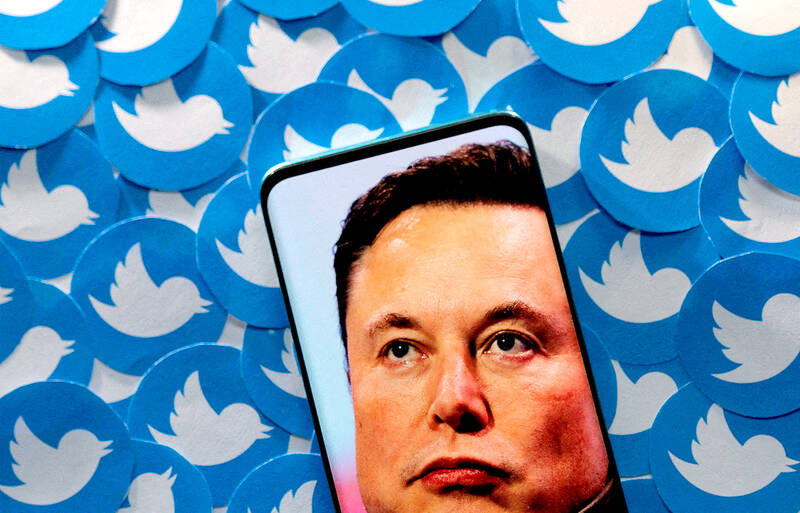Twitter Inc owner Elon Musk on Monday opened fire against Apple Inc over its tight control of what is allowed on the App Store, saying the iPhone maker has threatened to oust his recently acquired social media platform.
Musk also joined the chorus crying foul over a 30 percent fee Apple collects on transactions via its App Store — the sole gateway for applications to get onto its billion-plus mobile devices.
A series of Twitter posts fired off by Musk included a meme of a car with his first name on it veering onto a highway off-ramp labeled “Go to War,” instead of continuing onward toward “Pay 30%.”

Photo: Reuters
The billionaire CEO also wrote that Apple has “threatened to withhold Twitter from its App Store, but won’t tell us why.”
Apple did not immediately reply to a request for comment.
Apple and Google require social networking services on their app stores to have effective systems for moderating harmful or abusive content.
However, since taking over Twitter last month, Musk has cut about half of Twitter’s workforce, including many employees tasked with fighting disinformation, while an unknown number of others have voluntarily quit.
He has also reinstated previously banned accounts, including that of former US president Donald Trump.
Yoel Roth, the former head of trust and safety at Twitter who left after Musk took over, wrote in a New York Times op-ed that “failure to adhere to Apple’s and Google’s guidelines would be catastrophic,” and risk “expulsion from their app stores.”
Describing himself as a “free speech absolutist,” Musk believes that all content permitted by law should be allowed on Twitter, and on Monday described his actions as a “revolution against online censorship in America.”
He also wrote that he planned to publish “Twitter Files on free speech suppression,” but without clarifying what data he had in mind to share with the public.
Although Musk says Twitter is seeing record-high engagement with him at the helm, his approach has startled the company’s major moneymaker — advertisers.
In recent weeks, half of Twitter’s top 100 advertisers have announced they are suspending or have otherwise “seemingly stopped advertising on Twitter,” an analysis conducted by nonprofit watchdog group Media Matters found.
Musk on Monday accused Apple of also having “mostly stopped advertising on Twitter.”
“Do they hate free speech in America?” he asked, before replying with a post tagging Apple CEO Tim Cook.
In the first three months of this year, Apple was the top advertiser on Twitter, spending about US$48 million on ads that accounted for more than 4 percent of the social media platform’s revenue, according to a Washington Post report citing an internal Twitter document.
Sarah Roberts, an information studies expert at University of California, Los Angeles, told reporters that “Musk didn’t understand that Twitter itself was a brand, had cachet.”
“Now companies don’t even want to be associated with it. It’s not even that they worry about the content. Twitter is a tainted brand, a brand non grata companies don’t want to be associated with,” she added.

Stephen Garrett, a 27-year-old graduate student, always thought he would study in China, but first the country’s restrictive COVID-19 policies made it nearly impossible and now he has other concerns. The cost is one deterrent, but Garrett is more worried about restrictions on academic freedom and the personal risk of being stranded in China. He is not alone. Only about 700 American students are studying at Chinese universities, down from a peak of nearly 25,000 a decade ago, while there are nearly 300,000 Chinese students at US schools. Some young Americans are discouraged from investing their time in China by what they see

MAJOR DROP: CEO Tim Cook, who is visiting Hanoi, pledged the firm was committed to Vietnam after its smartphone shipments declined 9.6% annually in the first quarter Apple Inc yesterday said it would increase spending on suppliers in Vietnam, a key production hub, as CEO Tim Cook arrived in the country for a two-day visit. The iPhone maker announced the news in a statement on its Web site, but gave no details of how much it would spend or where the money would go. Cook is expected to meet programmers, content creators and students during his visit, online newspaper VnExpress reported. The visit comes as US President Joe Biden’s administration seeks to ramp up Vietnam’s role in the global tech supply chain to reduce the US’ dependence on China. Images on

New apartments in Taiwan’s major cities are getting smaller, while old apartments are increasingly occupied by older people, many of whom live alone, government data showed. The phenomenon has to do with sharpening unaffordable property prices and an aging population, property brokers said. Apartments with one bedroom that are two years old or older have gained a noticeable presence in the nation’s six special municipalities as well as Hsinchu county and city in the past five years, Evertrust Rehouse Co (永慶房產集團) found, citing data from the government’s real-price transaction platform. In Taipei, apartments with one bedroom accounted for 19 percent of deals last

US CONSCULTANT: The US Department of Commerce’s Ursula Burns is a rarely seen US government consultant to be put forward to sit on the board, nominated as an independent director Taiwan Semiconductor Manufacturing Co (TSMC, 台積電), the world’s largest contract chipmaker, yesterday nominated 10 candidates for its new board of directors, including Ursula Burns from the US Department of Commerce. It is rare that TSMC has nominated a US government consultant to sit on its board. Burns was nominated as one of seven independent directors. She is vice chair of the department’s Advisory Council on Supply Chain Competitiveness. Burns is to stand for election at TSMC’s annual shareholders’ meeting on June 4 along with the rest of the candidates. TSMC chairman Mark Liu (劉德音) was not on the list after in December last